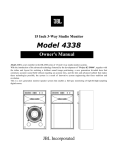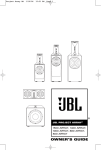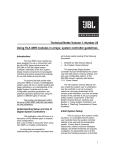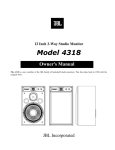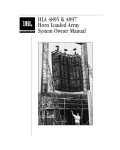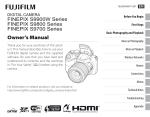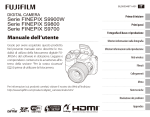Download JBL 4348 User's Manual
Transcript
15 Inch 4-Way Studio Monitor Model 4348 Owner's Manual Model 4348 is a new member in the JBL4300 series of 15-inch 4-way studio monitor systems. With the introduction of the advanced technology fostered by the development of "Project K2 S9800", together with the inline unit layout for realizing a brilliant sound image positioning, a new generation bi-radial horn that constructs accurate sound field without requiring an acoustic lens, and the slim and advanced cabinet that makes these technologies possible, the system is a result of innovative system engineering that fuses tradition and revolution. This is a new generation monitor speaker system that enables a full-spec monitoring of high-bit/high-sampling digital source. Studio Monitor Model 4348 JBL Incorporated 1: Introduction Thank you for purchasing the JBL 4-Way Studio Monitor 4348. In order to better understand and correctly use this product, please thoroughly read this Owner's Manual before using the product. 2: Unpacking The product should have been delivered complete in appearance and functionality. However, if you find any scratches or defects, please directly contact the store where you purchased the product. We recommend that you keep the original box and packing material after unpacking. Please note that if a product must be shipped for a repair service, JBL Incorporated will not be responsible for any damage incurred during shipping caused by insufficient packing. 3: Installation Avoid placing the monitors near power amplifiers or radiators that generate large amounts of heat, or in very humid or dusty places, and any places exposed to direct sunlight. Also place them on a firm, solid floor. •Settings Start the setup using a recorded sound source that has a distinct virtual center image. Once the center point between the speakers is obtained by measuring equal distances from the left and right speakers, adjust the distance between the listening position and the speakers, as well as the distance between right and left speakers, so that a precise center image is obtained. These monitors are designed to reproduce the most accurate stereo sound stage when the interior angle between the lines connecting from each speaker to the listener is between 40 to 60 degrees. Additionally, it is ideal that a distance of approximately 50 cm or more is maintained from the left and right walls. The center of the speaker's sound image is in the vicinity of the UHF (ultra-high-frequency) unit. Set the speakers so that the UHF unit is aligned at ear-level. In addition, to avoid acoustical interference with the floor surface, it is recommended that you set a sturdy base (cube or block shaped) with a thickness of 5 – 20 cm under the speakers. 4: Connection *Caution When connecting the speakers to the amplifier, always do so after turning off the power. Connecting the speakers while the power is on may damage the amplifier or the speakers. The two groups of input terminals on the 4348 support bi-wiring and bi-amping configurations. Follow the instructions below for each type of connection method: I. Single Wire Connection Using One Set of Speaker Cables Connect to either the upper or the lower terminals, leaving the short wires with the gold plated ring sleeves connected. II. Bi-wire Connection Using Two Sets of Speaker Cables Remove the short wires with the gold plated ring sleeves, and connect the high-frequency and the low-frequency cables to their respective terminals. III. Bi-amp Configuration Using Two Power Amplifiers and Internal Networking Remove the short wires with the gold plated ring sleeves, and connect the high-frequency and low-frequency amplifiers to their respective terminals. Although the two power amplifiers do not need to be identical, they should have similar output performance and same gain, or gains set to the same level in advance, through input adjustments IV. Bi-amp Configuration Using Two Power Amplifiers and a Commercial Channel Divider Using a Phillips screwdriver, remove the screws on the subhatch located towards the top of the back panel. Remove the hatch. Switch the mode switch inside to "Biamp" using a flat-head screwdriver, then screw the hatch back on. Remove the short wires with the gold plated ring sleeves, and connect the high-frequency and low-frequency amplifiers to their respective terminals. If you are using a channel divider that has a high-frequency level controller, the gain on the two amplifiers do not need to be the same. *Caution Except for bi-amp configuration with a channel divider, always keep the mode switch in the "Normal" position. The positive terminals of the speaker have a red ring, and the negative terminals have a black ring. Be sure to connect with out mistaking the polarity. The speakers are designed so that when a positive signal is applied to the positive terminal, the woofer moves in the forward direction (positive phase operation). When using the short wires with the gold plated ring sleeves, be sure that both the sleeves and the conductors are securely fastened to the terminals. In addition, use extra caution so that the cable conductors do not touch other sleeves and short out. In order to safely and securely connect to the terminals, we recommend that you use the Y terminals or banana plugs on the cable ends. 5. Attenuator Adjustment Independent, continuous variable attenuators are used for each unit to adjust the MF (mid-frequencies), HF (highfrequencies) and UHF (ultra-high-frequencies) levels to the speaker’s woofer level. The 0 dB position for each volume knob indicates a flat-level position in a test room, where there is little reverb. Make adjustments appropriate to the reverb in the actual room, and to your liking. In general, for most speakers, it takes about 1 – 2 months after initial use until the unit's vibration system yields optimum performance. As the level balance is expected to initially change with use, we recommend that you readjust the level accordingly. 6: Attaching the Grills The speakers are shipped with the grill installed. The purpose of the grill is to protect the units. The grill may be removed and re-attached as necessary. The speaker has separate UPPER and LOWER grills. Furthermore, the UPPER and LOWER parts each have a top side and a bottom side, so attach them according to the figure to the right. Studio Monitor Model 4348 7: Maintenance • When doing any maintenance, wipe the surface of the cabinet with a dry cloth to remove dust. Damp cloth or cleaning paper may dull the finish on the cabinet surface. Do not use volatile liquids such as benzene, paint thinner, alcohol, etc, and do not spray insecticide near it. • If dust gets into the grill netting, use a vacuum cleaner to remove it. In doing so, adjust the suction power of the vacuum cleaner so that it does not suction too strongly. Furthermore, do not wash the grill in water. The grill may sag or its color may become uneven. • If the surface of the speaker unit becomes dusty, use a soft, dry calligraphy brush or a paint brush to carefully sweep the dust away. Never use a damp cloth. •The speaker system is a durable consumer good. In particular, the edges of the woofer, which support rapid movement of the paper cone, undergo a great level of stress, and there is a limit to the number of years of its practical use. Also, the speakers' lifespan may be shortened by the effects of temperature, humidity or ultra-violet radiation. Please avoid exposing the speaker to strong lighting such as from lighting equipment or direct sunlight and avoid placing the speakers in high temperatures such as near the air conditioner exhaust pipe or a heat radiator. <Bias Battery> In this system, JBL's unique charge coupling method is used, in which a direct bias is constantly applied to the condensers in the network circuit to activate the elements, removing zero crossover distortion. This battery has a life of about two years. Even if the battery voltage drops, there is no impediment to the network function. However, in order to maintain superior sound quality, we recommend that you change the battery periodically. Like the network mode switch, unscrew the screws for the subhatch at the top on the rear-panel and remove the hatch to change the battery. When doing so, check the positive and negative sides of the battery (9V, rectangular 006P type battery) and install it correctly. The battery included in the shipped system is for testing purpose only. We recommend that you replace it as soon as possible. 8: Specifications Type Units used Impedance Allowable input Output sound pressure level Frequency response Crossover frequencies Dimensions (W x H x D) Weight 4-way floor type 38 cm pure pulp cone woofer 1500FE 25 cm fiber composite cone/mid-range transducer 2251J-1 75 mm aluminum compression driver 435AI 25 mm pure titanium compression driver 045Ti 6Ω 400 W (RMS) 95 dB (2.83 V/1m) 33 Hz – 40 KHz (-6 dB) 300 Hz, 1 kHz, 10 kHz 597 x 1080 x 400 mm (with grill 425 mm) 90.4 kg




